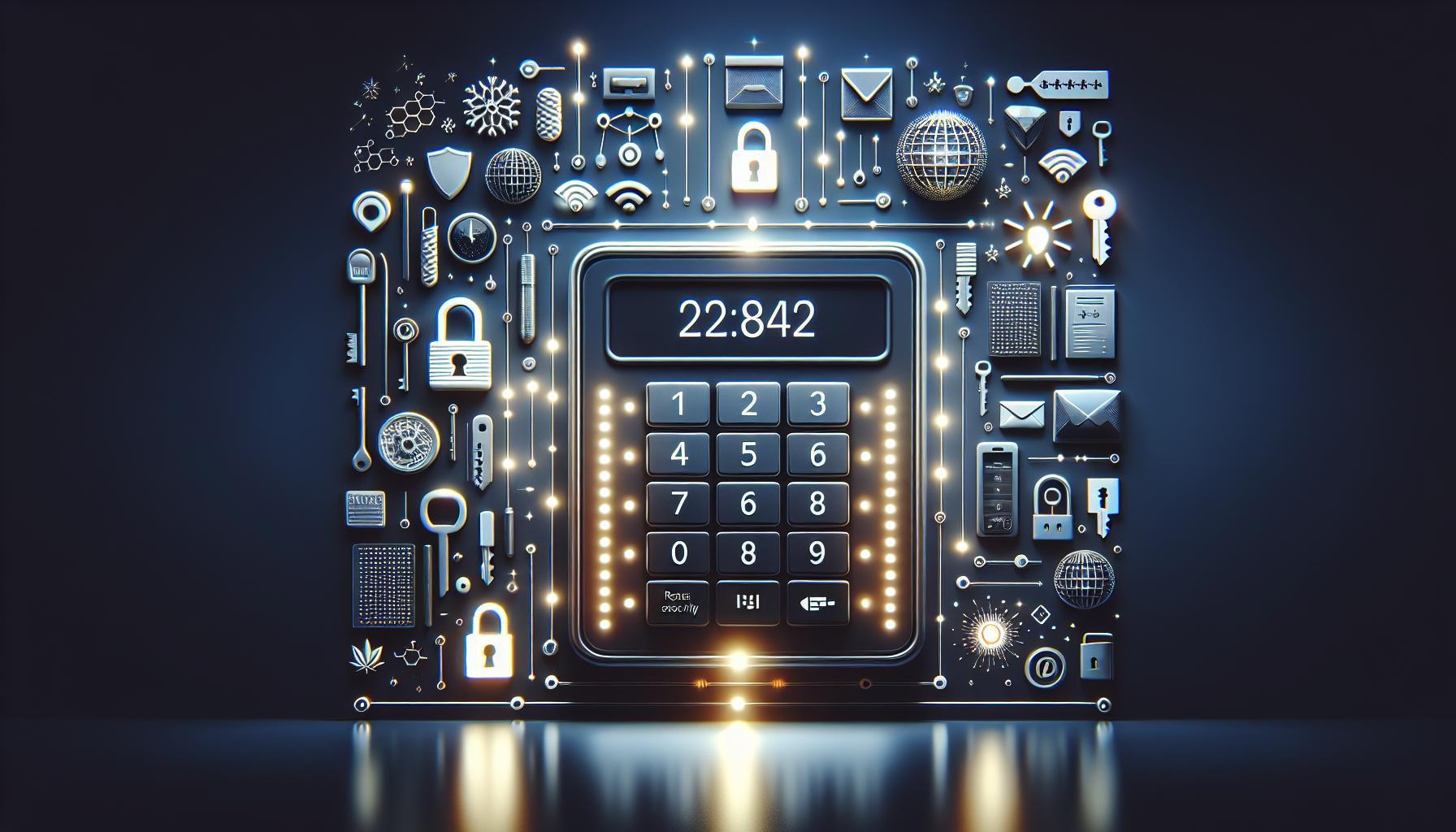As cyber threats grow increasingly sophisticated, the need for strong, memorable passwords has never been more crucial. by generating passwords based on familiar words, you can create personalized codes that enhance security while remaining easy to recall. This approach not only protects your accounts but also simplifies your online experience, making password management less daunting.
Understanding the Basics: What are Passwords and Why They Matter
In an increasingly digital world, passwords serve as our first line of defense against unauthorized access to personal and professional details.A password is essentially a secret code that grants access to digital accounts, devices, and sensitive data. This seemingly simple function is charged with the crucial role of protecting our identities and safeguarding our assets from malicious attacks. the importance of choosing robust passwords cannot be overstated; weak passwords are easily exploited,leading to identity theft,financial loss,and privacy invasions.
Creating effective passwords involves more than merely stringing together memorable characters. To fortify your security, it’s advisable to adopt methods like generating passwords based on specific words or phrases that are meaningful yet obscure to others. This technique,often referred to in discussions about personalized security,allows users to create memorable yet complex passwords that include a mix of upper and lower case letters,numbers,and special symbols,thereby enhancing their strength. As a notable example, converting a phrase like “I love sailing at sunset!” into a password could yield something like “I❤️Sailing@Sunset21”.
Characteristics of Strong Passwords
Effective passwords share common traits that substantially increase their security. Consider the following guidelines when crafting your passwords:
- Length: Aim for at least 12-16 characters, as longer passwords are harder to crack.
- Complexity: Incorporate a mix of upper and lower case letters, numbers, and symbols.
- Uniqueness: Avoid using the same password across multiple accounts to reduce risk.
- Memorability: Use phrases or personal cues that make sense to you but are tough for others to guess.
By following these principles, individuals can significantly enhance their digital security.Tools and resources like password managers can also provide assistance in generating and storing complex passwords, making the process seamless and secure.
Ultimately, passwords are not just a means of logging into websites; they are a essential aspect of our online security infrastructure. As we become more reliant on technology, understanding how to create and manage complex passwords through methods such as personalized generation is essential. The more effort we invest in constructing our passwords, the safer we remain in an ever-evolving digital landscape.
Crafting Your Unique Word-Based Password: Step-by-Step Guide
Crafting a strong password is one of the most crucial steps in safeguarding your digital life. Many people resort to simple, memorable passwords, unaware of how vulnerable they leave their accounts. By opting for a password based on words,you can create a fortress of security that is both memorable and robust. This guide will walk you through the process of generating such a password, allowing you to enhance your online safety with ease and confidence.
Choosing Your Base Words
Begin by selecting a set of unique words that have personal importance to you. These can be names of favorite places, beloved pets, or memorable experiences. Aim for 3-5 words to form the foundation of your password. this method blends personal meaning with complexity, making it easier for you to remember while difficult for others to guess. For example:
- Sunny
- Hawaii
- Chocolate
- Whale
Once you have selected your words, consider how you can manipulate them for added security. You might capitalize certain letters, replace common letters with numbers or symbols (such as ‘a’ with ‘@’, or ‘o’ with ‘0’), or even add a special character between each word.
structuring Your Password
Now it’s time to format your password creatively. One effective strategy is to intertwine the words with numbers or special characters. For example, from the words above, you could create a password like:
Sunny@Hawaii22!Chocolate
You could also employ a meaningful phrase as a guide, such as “When I went to hawaii, I saw chocolate whales!” This phrase exactly captures the components of your password while adding an extra layer of complexity.
Testing Your Password Strength
Once you’ve crafted your password, it’s critically important to evaluate its strength. You can use online password strength checkers to ensure your creation is robust against potential breaches. A strong password should be at least 12-16 characters long, incorporating uppercase and lowercase letters, numbers, and special characters.
| Password Feature | Recommended Practice |
|---|---|
| Length | 12-16 characters |
| Variety | Include upper and lower case, numbers, special characters |
| Memorability | Use meaningful words or phrases |
By following these steps and using the method to generate a password based on words, you’ll have a personalized and secure password that not only protects your accounts but is also easy to remember.
Best Practices for Creating Memorable Yet secure Passwords
In a digital age rife with data breaches and cyber threats, the importance of crafting a unique and robust password cannot be overstated. Many individuals still opt for weak passwords, often using easily guessable words or phrases.Though, creating memorable yet secure passwords is not only possible but also straightforward when you know the right techniques. By learning to generate a password based on words,you can add an essential layer of security while ensuring your credentials are easy to recall.
### Focus on Length and Complexity
One of the primary strategies for creating a strong password is to prioritize both length and complexity.A longer password that weaves together unrelated words can significantly enhance security. Consider these methods to boost your password strength:
- Passphrase Method: Compose a phrase using four or more unrelated words. As an example, “Butterfly-1Shoe#Coffee!” is a delightful mix that’s more challenging to crack than a simple word.
- Substitution: Increase complexity by substituting letters with numbers and symbols.For example,replace ’E’ with ‘3’ or ‘A’ with ‘@’ to make another evolution of the example phrase: “Bu77erfly-1Sho3#C0ffee!”
- Random Capitalization: Randomly capitalize letters within your phrase,for instance,”BuTTerfly-1shoE#CoFfee!” This adds another layer of unpredictability.
### Utilize Tools for Personalization
To further simplify the process of creating memorable passwords, consider using generators designed to create secure passwords based on words or phrases you choose. Incorporating personalization into your security routine can make your password not only secure but also easy to remember.
| Tool | Description | Benefits |
|---|---|---|
| Password Generator | Online tools that create passwords using various algorithms. | Fast and secure results based on encrypted algorithms. |
| Phrase-Based Generator | creates passwords from random phrases or words of your choice. | Customized and memorable, ideal for everyday use. |
| Password Manager | Stores your passwords and generates strong ones on-demand. | Keeps your passwords secure and accessible without stress. |
### Practice Good Password Hygiene
Lastly, it’s crucial to adopt good password hygiene. Regularly changing your passwords and avoiding using the same one across multiple sites can dramatically reduce your vulnerability. Whenever possible, enable two-factor authentication (2FA). this additional step ensures that even if someone does manage to acquire your password, they’ll still need a second verification method to access your accounts.
By applying these best practices, you can create passwords that are not only safe but also personalized, paving the way for simpler, more secure online experiences. Remember, the goal is to generate a password based on words that remain memorable while fortifying your defenses against potential threats.
The role of Special Characters and Numbers in Password Strength
In a digital landscape where breaching accounts has never been easier, enhancing password security has become paramount.One of the most effective strategies is to incorporate special characters and numbers into your passwords. This practice not only increases the complexity of your password but also significantly raises the difficulty for cyber attackers trying to crack it.
Why Special Characters Matter
Special characters, including symbols like @, #, $, and %, act as powerful deterrents against brute-force attacks. When a password consists of a mix of letters, numbers, and special characters, it expands the possible combinations exponentially. For instance, a password like “Password123!” is far more complex than “Password123” because the addition of a special character creates a unique pattern that can take much longer for a hacker to guess.
- Increased Complexity: The use of special characters in your passwords can turn a relatively simple combination into a highly complex one, where each added character significantly expands the set of possible variations.
- Reduced Predictability: Passwords that are predictable (like “12345” or “password”) can be easily cracked; however, introducing special characters disrupts the predictable nature of common passwords.
The Role of Numbers in Strengthening Passwords
Just like special characters, numbers further complicate passwords and increase their resilience against attacks. Many users make the mistake of using easily guessable numerical strings, like birthdays or “1234”. Rather, integrating numbers with a specific pattern can enhance security. Such as, using a sequence like “4U!B3@C0” mixes letters, special characters, and numbers effectively.
| Password Example | Password Strength |
|---|---|
| Password123 | Weak |
| Passw0rd! | Moderate |
| 4U!B3@C0 | Strong |
Ultimately, the best approach is to generate passwords based on words that are meaningful to you and add an array of special characters and numbers throughout. This custom strategy, as outlined in the process of generating a password based on a word, not only makes it easier to remember but also robust enough to withstand attempts at unraveling it by unauthorized users. incorporating these elements transforms a simple passphrase into a fortress of digital security.
Tools and Techniques for Managing Your Personalized Passwords
Managing personalized passwords can often feel like a daunting task, especially in an age where data breaches and hacking attempts are alarmingly common.To ensure your online accounts remain secure, utilizing tools and techniques specifically designed to manage passwords is essential. Incorporating these methods allows you to generate a password based on a word in a way that is both memorable and secure.
Choosing the Right Password manager
A reliable password manager can serve as your first line of defense against unauthorized access. These tools not only store and encrypt your passwords but also offer options to generate your passwords based on words or phrases you choose. When selecting a password manager, consider the following features:
- Encryption Standards: Look for managers that use AES-256 encryption to safeguard your data.
- User-Friendly interface: Ensure the tool is easy to navigate, allowing for rapid access and management.
- Multi-Device Synchronization: choose a password manager that works seamlessly across multiple platforms.
- Backup and Recovery Options: Opt for services that provide recovery solutions in case you forget your master password.
Generating Strong Yet memorable Passwords
To effectively generate a password based on your chosen words, you can adopt various techniques. One popular method is incorporating additional characters or numbers based on personal significance. This not only enhances security but also improves memorability. As a notable example,if you love the word “ocean,” you could transform it into “0c3an!Love$” by replacing certain letters with numbers and adding symbols.
Another tactic is to use phrases rather of single words. This passes the challenge of memorizing complex characters. Consider the phrase “I love to surf on Saturdays!” You can condense this into a password format: “ILuv2Srf!S@t!” This structure keeps it manageable while also being highly secure.
Implementing Regular Updates and Reviews
Establishing a routine for updating your passwords can significantly enhance your account security. Regularly changing passwords—such as every three to six months—can stave off potential breaches. To streamline this process, create a simple schedule or reminder system. As a notable example, you might mark the date in your calendar, prompting you to generate a new password based on a word or phrase that resonates with you at the time.
Additionally, regularly reviewing the security of your accounts can help identify vulnerability. If you notice repeated security alerts from a service, it might be an indication that you need to strengthen your password strategy.
By leveraging these tools and techniques, not only can you generate passwords based on words for personalized security, but you also cultivate a system that protects your digital identity efficiently.
Enhancing Your Security: Two-Factor Authentication Explained
In today’s digital landscape, securing your online accounts is more critical than ever. With data breaches and identity theft becoming increasingly common, relying solely on passwords is no longer enough. This is where two-factor authentication (2FA) shines as a robust layer of security. By adding a second step to your login process, you significantly reduce the risk of unauthorized access, even if your password is compromised.
Understanding Two-Factor Authentication
Two-factor authentication is an extra security measure that requires not just a password and username but also something that only the user has on them.This second factor can be a code sent to your smartphone, a fingerprint scan, or even a hardware token. This dual verification process makes it exponentially harder for attackers to gain access to your accounts.
- First Factor: Something you know (your password).
- Second Factor: something you have (a one-time code sent to your phone or a physical security key).
For example, when you log into your bank account online, after entering your password, you may receive a text message with a one-time code that you need to enter to complete the login. This additional step acts as a safeguard, ensuring that only you can access your sensitive information, thereby enhancing your security postures.
Practical Implementation of 2FA
Implementing two-factor authentication is straightforward and often free. Most major online services,including email providers,social media platforms,and banks,now offer this feature. Here’s how you can set it up:
- Log in to your account and navigate to the security settings.
- Look for the option to enable two-factor authentication.
- Choose your second factor (SMS, authenticator app, or hardware key).
- Follow the instructions to link your device and complete the setup process.
By following these steps,you can bolster your account security and safeguard your personal information. Remember, while generating passwords based on words can enhance your password strength and memorability—adding two-factor authentication is a vital step toward extensive account protection.
Common Mistakes to Avoid When Generating Passwords
When it comes to creating secure passwords, many individuals fall into the same traps time and time again. The significance of a strong password cannot be overstated, as it is often the first line of defense against unauthorized access to personal and sensitive information. With the rising incidence of data breaches, adopting smart password practices has never been more crucial. Understanding the common pitfalls can help anyone generate a password based on word principles that truly enhance security while remaining memorable.
common Pitfalls in Password Creation
- Using familiar Words or Phrases: While generating a password based on words from your favorite book or a personal motto may seem like an excellent idea, it can be easily guessed or cracked using dictionary attacks. Aim for words that are less common or modify them in a way that makes them unique.
- Neglecting Length: One of the easiest ways to enhance password security is to increase its length. A common mistake is to limit passwords to eight characters. Instead, consider creating a longer phrase or a combination of words to strengthen password complexity.
- Incorporating Personal Information: Avoid using easily accessible details such as birthdays, names of pets, or addresses. These types of information can often be found on social media or other public platforms,making them vulnerabilities in password security.
- Reusing Passwords: Using the same password across multiple accounts is an invitation for disaster. If one account is compromised, all others using that same password are at risk. Generate a unique password for each service to minimize this risk.
Practical Tips for Effective Password Generation
Take actionable steps to ensure that your passwords remain robust. As a notable example, consider the following strategy that utilizes a beloved saying or personable quote, which can then be modified for added complexity. By using a memorable phrase, you can tweak it by interspersing numbers or symbols that relate to your life, resulting in something much more secure.
| Base Phrase | Modified password |
|---|---|
| “To be or not to be” | 2B@Rnot2B! |
| “All that glitters is not gold” | All^thatG!itters2023 |
| “The only thing we have to fear is fear itself” | The0nlyF8ear! |
Armed with these insights, you can now work towards generating passwords that offer personalized security while steering clear of common mistakes. By following best practices and utilizing creative methodologies,you’ll ensure that your online presence is safeguarded against potential threats.
Adapting Your Password Strategy for Different Platforms and Devices
In today’s digital landscape, where we juggle countless accounts across various platforms, a tailored approach to password management has never been more crucial. With hackers constantly evolving their tactics, the need for a personalized yet robust security solution is paramount. The ability to generate passwords based on words offers a novel way to maintain security without compromising convenience. However, this is not a one-size-fits-all strategy; adapting your password tactics to different platforms and devices is essential for optimal protection.
Understanding Platform-Specific Needs
Each platform demands unique considerations.Social media sites might connect you to many users who can help or hinder your experience, while banking apps often require the strictest security. Knowing the specifics can definitely help you create a passwords strategy that balances security and usability.
- Social Media: Use a strong, memorable phrase that incorporates numbers and symbols (e.g., “Cats2023#Unite!”). this allows you to connect with friends while maintaining a level of security to keep your information private.
- Banking and Financial Apps: Create long passwords using a random sequence of words for added complexity (e.g., “Butterfly$Space39!Giraffe”). Avoid common phrases and ensure it is difficult to guess.
- Online shopping: while the risk is lower, don’t be complacent. Generate words that pertain to your favorite purchases but in a twisted way (e.g., “Shoes!My#2023=Goal”).
Device-Specific Strategies
Your approach should also vary across devices. Many people access accounts on different devices: desktops at work, smartphones on the go, and tablets at home. Each device presents its own vulnerabilities.
| Device Type | Recommended Password Strategy |
|---|---|
| Mobile Devices | Use a password manager that can generate and store complex passwords. Enable biometric login for added security. |
| Desktops | Create longer phrases based on a memorable sentence.Utilize browser extensions to store passwords safely. |
| Tablets | Pair simple passphrases with unique identifiers like a special number or character that you only use for your tablet. |
By refining your method to generate passwords based on words that reflect your life, while also considering the unique requirements of each platform and device, you’ll enhance your digital security. Personalization in your password strategy is key to creating a fortified barrier against intrusions and ensuring your online experience remains safe and enjoyable.
Q&A
What is the best way to generate a password based on a word?
The best way to generate a password based on a word is to combine the word with additional characters,numbers,and symbols for enhanced security. Such as,you could use “apple” and transform it into ”App!3L@2023″.
Using a familiar word as a base can make the password easier to remember,while adding complexity reduces vulnerability. Consider including personal numbers or memorable dates to make the password unique but still relatable. For more strategies, check our article on enhancing password security.
Why does using a word to generate passwords improve security?
Using a word to generate passwords improves security by making passwords easier to remember while still allowing for complex combinations. This blend helps users create strong passwords that are not easily guessed.
Strong passwords typically include a mix of uppercase letters, lowercase letters, numbers, and symbols. By starting with a memorable word and adding these elements, users can ensure their passwords are unique and difficult for attackers to crack. This method supports personalized security and enhances your overall digital safety.
Can I customize my password generation process?
Yes,you can customize your password generation process by selecting the word,length,and complexity parameters. Many online tools allow users to personalize these elements for unique results.
For instance, you might prefer your password to include specific symbols or numbers notable to you. Tailoring your password generation makes it easier to remember while maximizing security, allowing for a balance between personal relevance and complexity.
how do I ensure my generated password is strong?
To ensure your generated password is strong, use a combination of a memorable word with random numbers, symbols, and varied case letters.A strong password is typically at least 12 characters long.
Consider using a phrase instead of a single word. For example, “MyDogRex#2023Lives!” incorporates symbols and gives actionable length without sacrificing memorability. These strategies help in creating passwords that uphold your security effortlessly.
What are the benefits of using a password manager?
Using a password manager enables you to securely store and generate passwords based on a chosen word or phrase without needing to remember them all. This greatly enhances your overall security.
Password managers can automatically generate complex passwords and securely store them, reducing the need to memorize multiple passwords. They can also alert you about weak or duplicate passwords, further enhancing your personalized security. For more about effective password management,visit our detailed guide on password security.
Can generating passwords based on words lead to vulnerabilities?
Generating passwords based on familiar words can possibly lead to vulnerabilities if not done thoughtfully. Common words or phrases are easier for attackers to guess.
To mitigate this risk, it is important to pair these words with unexpected numbers, symbols, or mixed case letters. Avoid using widely recognizable words or information closely tied to you, such as birthdays or pet names. This approach enhances your security while still allowing for ease of memory in your password.
What tools can I use to generate passwords based on a word?
There are numerous online tools and password managers available that can help you generate passwords based on a word.Many of these tools allow personalization options for stronger security.
Look for tools like LastPass, Bitwarden, or 1Password, which provide customizable settings to create passwords incorporating your chosen words with added complexity.These resources not only enhance your password generation but also help in organizing them securely.
The Way Forward
generating passwords based on a word can be a straightforward yet effective way to enhance your personal security. By personalizing your passwords, you increase their memorability while also adding complexity that makes them harder to crack. Remember to incorporate a mix of upper and lower case letters, numbers, and symbols to create strong passwords that are unique to each of your accounts. Utilizing tools like online password generators can further simplify this process, allowing you to create secure passwords effortlessly.
Exploring various techniques for generating passwords will empower you to safeguard your information effectively. Don’t hesitate to experiment with different methods and find what works best for you. Additionally, consider using a password manager to keep track of your passwords securely. Stay informed and proactive about your online security, as it plays a crucial role in protecting your digital life.For more insights and tools to enhance your password security, continue delving into our articles and resources. Your safety is just a strong password away!







